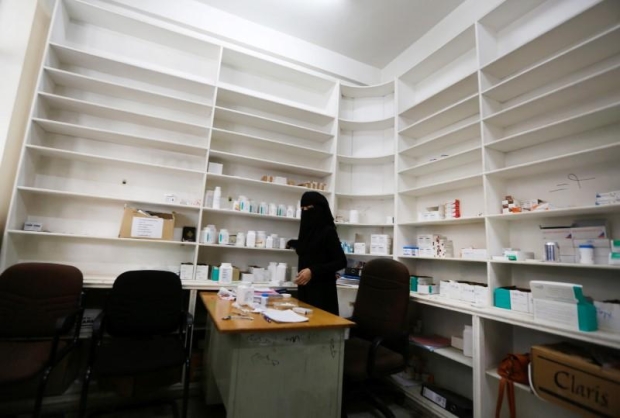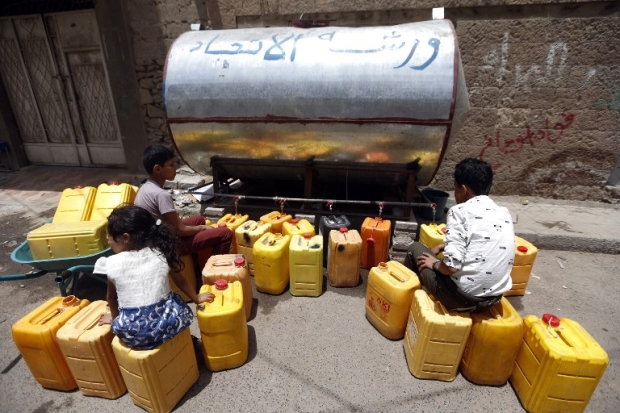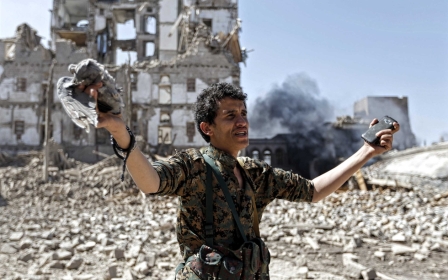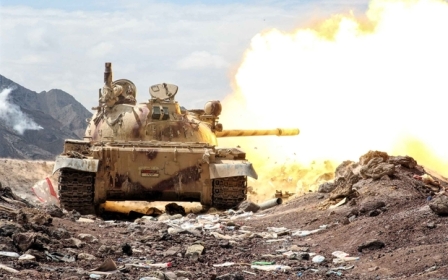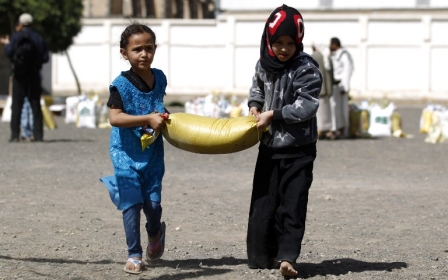Privatisation by war: Poor pay more for Yemen's cash-starved services
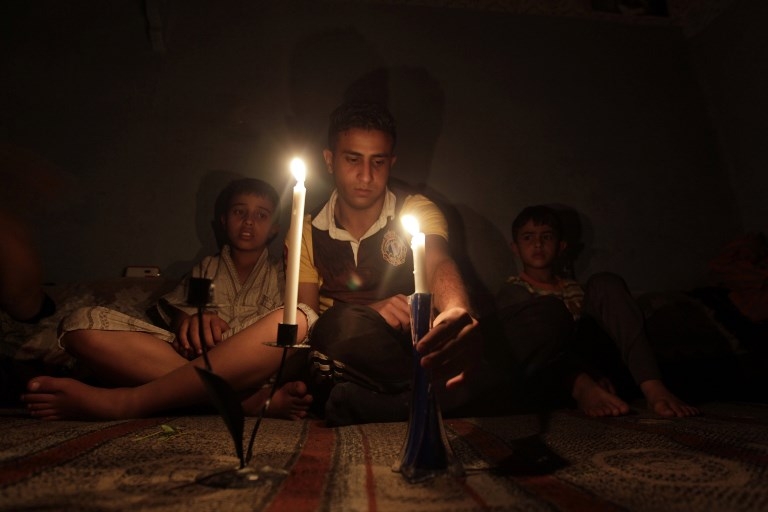
TAIZ, Yemen - When the wife of Ibrahim al-Zazaie, 35, went into labour with their third child, he immediately decided to take her to Khalifa Hospital, 70km from Taiz city.
It was the middle of the night. Zazaie, who works as a builder, grabbed all of the money that he had, just under $40, and they headed to the public hospital. It was far away, but cheaper than the private ones nearby - at least he thought so.
After their son Ahmed was born, Zazaie sold two rings and several pairs of earrings to pay the fee so the hospital would let them go home
"It was around 1am and the hospital was almost free from patients walking in the aisles, so I took my wife easily from the taxi to birthing room," Zazaie said.
But once there, a Russian doctor in charge refused to treat his wife before the couple sorted out her details with the hospital's accountant – for $20. The taxi ride alone had cost $28. So Zazaie had to find the cash quickly.
He said a prayer, left his wife and went home to collect all of her jewellery. The next day, after their son Ahmed was born, Zazaie sold two rings and several pairs of earrings to pay the fee so the hospital would let them go home.
New MEE newsletter: Jerusalem Dispatch
Sign up to get the latest insights and analysis on Israel-Palestine, alongside Turkey Unpacked and other MEE newsletters
At $123, Zazaie said, the final bill was six times more than he would have paid at public hospital birth before the civil war that has savaged the country since 2015 – and was equivalent to the cost of private care.
Strained public sector
After more than two years of war, Yemen's public sector is buckling.
With budgets halted and employee salaries paid irregularly, hospitals, water and electricity providers, schools and other public-sector operations can no longer afford to provide Yemenis with free or cheap services as they did in the past.
So they are imposing fees to provide even the most basic services, forcing many Yemenis such as Zazaie, more than 70 percent of whom are already receiving humanitarian support, to spend more money on basic services - or pick and choose the bare essentials.
Government officials and public sector managers acknowledge the gravity of the situation, but find themselves stuck in an impossible situation, further aggravated by a Saudi-led blockade.
"The new fees do not solve the problem, but they help to provide hospitals with the least needs to continue in their works," said Dr Abdul Rahim al-Samei, manager of the health office in Taiz.
Some hospitals, including Al-Thawra, Taiz's largest public hospital, face their own increased costs for fuel to keep electricity on and to pay staff and are under threat of closure.
"We know that some people cannot pay the fees. but hospitals cannot work without them and people should understand this,” he said.
'Learning is a priority'
Some Yemenis, like Zazaie, have been able to pull together money to get the goods and services they need. But others, like Sultan Sharaf, have had to go without.
Gradually over the months after the war started in March 2015, the budgets of public corporations in northern Yemen were cut. In turn, they cut off electricity and water to the public.
Sharaf, a retired soldier who lives in Sanaa with his six children, receives pension payments irregularly. So when his electricity bill jumped from $8 to $80, he had to decide between paying for their education or keeping the lights on; now the family spends the evenings mostly in the dark, using only a solar panel and a battery for light at night.
"Learning is a priority for me, so I pay for study of my children while we live without electricity because it costs so much," he said.
While solar energy has been a solution to provide light for many Yemenis, the costs of operating refrigerators, washing machines, heaters and other electronic machines is so expensive that many have done away with them.
For water, Shahaf's family relies on a good Samaritan who transports water to their neighbourhood every other day and they carry it home in bottles.
Of course, for Yemenis with money, they are other options: investors rented the electricity corporation's generators and started to provide those who can pay with electricity.
Like Sharaf, many Yemenis are forgoing other necessities to pay for their children to learn, but increasingly, as schools struggle to stay open amid irregular budgets and frequent strikes, many are also charging new fees.
I have four children. I cannot pay $16 for them every month, so they cannot continue to study
- Ali Mohammed Saeed, farmer in Taiz City
"The school asked me to pay $4 per month for my daughter's study and I will pay because I want her to learn," Thana Abdul Khaleq told MEE.
For a monthly fee of $20, Khaleq said, the public school is still more affordable than local private schools.
But at a time when UNICEF is warning that 4.5 million Yemeni school children in northern provinces are at risk of losing access to education because of school closures, not all families can find deals like that.
"I have four children," said Ali Mohammed Saeed, a farmer in Taiz city. "I cannot pay $16 for them every month, so they cannot continue to study."
Pay or go without
Abdu al-Abdali, press secretary of the deputy prime minister for economic affairs in Sanaa, said the government is doing its best to help people as the war continues, but the Saudi-led blockade has hindered their efforts.
"Yemenis are victims of the aggression and blockade and there is no one to help, so institutions resort to increasing the fees to some extent to continue," Abdali told MEE.
"All people are suffering nowadays, and we should help each other to continue. If this war was in another country, we would not see the public services at all."
If the government cannot provide the poorest people with basic services like water, healthcare and study, that means a failure by the government
- Ahmed Saeed, central bank economist
Abdali added that the government is particularly concerned that some traders are taking advantage of the situation to exploit Yemenis, charging expensive prices that only rich people can afford.
Ali al-Emad, the head of the Supervision Committee, which is responsible for supervising government services, said in an interview earlier this month with the Houthi-run al-Masirah TV channel, that it is clear now that many public institutions are acting like private ones, something the government should see as a failure.
But economist Ahmed Saeed, who works for the central bank in Sanaa, told MEE that the bigger failure would have been if the government had left Yemenis without any options for basic necessities, even if they have to pay.
"When the Yemeni government could not provide people with fuel, it allowed traders and private companies to import the fuel," he said.
"If the government cannot provide the poorest people with basic services like water, healthcare and study, that means a failure by the government."
Back at home with his new baby, Zazaie can see the failure up close: after losing electricity and water, he hadn't thought the war could impact civilians any harder than it already had. But his hospital experience made him think differently.
"I was happy to have a new child but the new fees of public hospitals deprived me from happiness and I was only thinking about money to save my wife and baby,” he said.
"We can live without electricity and other services, but healthcare is essential," he said. "So I hope that our government can reduce the fees of healthcare as before."
This article is available in French on Middle East Eye French edition.
Middle East Eye delivers independent and unrivalled coverage and analysis of the Middle East, North Africa and beyond. To learn more about republishing this content and the associated fees, please fill out this form. More about MEE can be found here.


